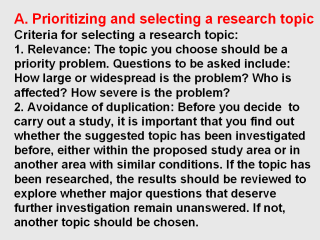| front |1 |2 |3 |4 |5 |6 |7 |8 |9 |10 |11 |12 |13 |14 |15 |16 |17 |18 |19 |20 |21 |22 |23 |24 |25 |26 |27 |28 |29 |30 |31 |review |
 |
3. Urgency of data needed (timeliness): Are
data urgently needed for decision-making or developing interventions at
various levels (from community to policy)? 4. Political acceptability of study: Is the topic acceptable to high level policymakers? Or has the topic been the interest and support of the local/national authorities? 5. Feasibility of study: Look at the project you are proposing and consider the complexity of the problem and the resources you will require carrying out your study. Thought should be given first to manpower, time, equipment and money that are locally available. 6. Applicability of results: Is it likely that the recommendations from the study will be applied? 7. Ethical acceptability: We should always consider the possibility that we may inflict harm on others while carrying out research. Therefore, review the study you are proposing and consider important ethical issues such as:
|